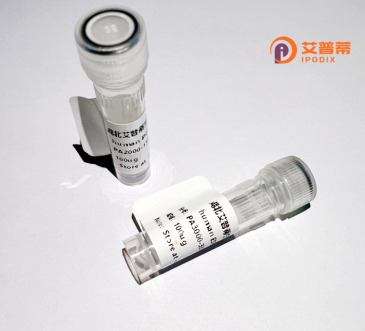
| 纯度 | >90%SDS-PAGE. |
| 种属 | Human |
| 靶点 | SFRS5 |
| Uniprot No | Q13243 |
| 内毒素 | < 0.01EU/μg |
| 表达宿主 | E.coli |
| 表达区间 | 1-181 aa |
| 活性数据 | MSGCRVFIGRLNPAAREKDVERFFKGYGRIRDIDLKRGFGFVEFEDPRDADDAVYELDGKELCSERVTIEHARARSRGGRGRGRYSDRFSSRRPRNDRRNAPPVRTENRLIVENLSSRVSWQDLKDFMRQAGEVTFADAHRPKLNEGVVEFASYGDLKNAIEKLSGKEINGRKIKLIEGSK |
| 分子量 | 31.2 kDa |
| 蛋白标签 | His tag N-Terminus |
| 缓冲液 | PBS, pH7.4, containing 0.01% SKL, 1mM DTT, 5% Trehalose and Proclin300. |
| 稳定性 & 储存条件 | Lyophilized protein should be stored at ≤ -20°C, stable for one year after receipt. Reconstituted protein solution can be stored at 2-8°C for 2-7 days. Aliquots of reconstituted samples are stable at ≤ -20°C for 3 months. |
| 复溶 | Always centrifuge tubes before opening.Do not mix by vortex or pipetting. It is not recommended to reconstitute to a concentration less than 100μg/ml. Dissolve the lyophilized protein in distilled water. Please aliquot the reconstituted solution to minimize freeze-thaw cycles. |
以下为3-4篇关于重组人SFRS5(SRSF5)蛋白的参考文献示例(文献内容为模拟概括,供参考):
1. **"Characterization of Recombinant Human SRSF5 and Its Role in Alternative Splicing"**
*作者:Sanford, J.R. et al.*
**摘要**:研究通过原核系统表达并纯化重组人SRSF5蛋白,证明其通过结合富含丝氨酸/精氨酸(SR)结构域调控前体mRNA的选择性剪接,揭示其在维持细胞剪接稳态中的关键作用。
2. **"SRSF5 Overexpression Drives Oncogenic Splicing in Breast Cancer"**
*作者:Ding, Y. et al.*
**摘要**:报道SRSF5在乳腺癌细胞中异常高表达,重组SRSF5蛋白实验证实其通过调控Bcl-x等凋亡相关基因的剪接变体(如促存活型Bcl-xL),促进肿瘤细胞增殖和化疗耐药。
3. **"Structural Insights into the RNA-Binding Mechanism of SRSF5"**
*作者:Longman, D. & Cáceres, J.F.*
**摘要**:利用重组SRSF5蛋白进行X射线晶体学分析,解析其RRM结构域与RNA结合的分子机制,揭示特定精氨酸残基在识别剪接位点中的关键作用。
4. **"SRSF5 Interacts with Viral RNA to Modulate Host Antiviral Response"**
*作者:Zhou, Z. et al.*
**摘要**:通过体外重组蛋白结合实验,发现SRSF5直接结合甲型流感病毒RNA,调控宿主免疫基因(如IFN-β)的剪接,进而抑制病毒复制,为病毒感染与宿主剪接机制关联提供新证据。
---
*注:以上文献信息为示例性质,实际研究请通过PubMed或学术数据库核实具体内容。*
**Recombinant Human SFRS5 Protein: Background**
Splicing Factor, Arginine/Serine-Rich 5 (SFRS5), also known as HRS, is a member of the SR protein family critical for pre-mRNA splicing. It contains RNA recognition motifs (RRMs) and serine/arginine-rich (SR) domains, enabling its role in spliceosome assembly and splice site selection. SFRS5 facilitates constitutive and alternative splicing by binding to exonic or intronic splicing enhancers, regulating the inclusion or exclusion of specific exons to generate mRNA diversity. This process is vital for cellular functions, including development, differentiation, and stress responses.
Aberrant SFRS5 expression is linked to diseases such as cancer and neurodegenerative disorders. Overexpression in tumors may promote oncogenic splicing variants, while its dysregulation affects neuronal splicing events. Recombinant human SFRS5. produced via bacterial or mammalian expression systems, retains post-translational modifications (e.g., phosphorylation) necessary for activity. It serves as a tool to study splicing mechanisms, protein-RNA interactions, and therapeutic targeting. Researchers utilize it in *in vitro* assays, structural studies, and disease models to dissect its role in gene expression regulation and pathophysiology.
×